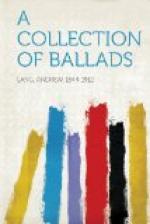THE BATTLE OF HARLAW
Fought on July 24, 1411. This fight broke the Highland force in Scotland. The first version is, of course, literary, perhaps a composition of 1550, or even earlier. The second version is traditional, and was procured by Aytoun from Lady John Scott, herself the author of some beautiful songs. But the best ballad on the Red Harlaw is that placed by Scott in the mouth of Elspeth, in The Antiquary. This, indeed, is beyond all rivalry the most splendid modern imitation of the ancient popular Muse.
DICKIE MACPHALION
A great favourite of Scott’s, who heard it sung at Miss Edgeworth’s, during his tour in Ireland (1825). One verse recurs in a Jacobite chant, probably of 1745-1760, but the bibliography of Jacobite songs is especially obscure.
A LYKE-WAKE DIRGE
From the Border Minstrelsy. The ideas are mainly pre-Christian; the Brig o’ Dread occurs in Islamite and Iroquois belief, and in almost all mythologies the souls have to cross a River. Music for this dirge is given in Mr. Harold Boulton’s and Miss Macleod’s Songs of the North.
THE LAIRD OF WARISTOUN
This version was taken down by Sir Walter Scott from his mother’s recitation, for Jamieson’s book of ballads. Jamieson later quarrelled bitterly with Sir Walter, as letters at Abbotsford prove. A variant is given by Kinloch, and a longer, less poetical, but more historically accurate version is given by Buchan. The House of Waristoun is, or lately was, a melancholy place hanging above a narrow lake, in the northern suburbs of Edinburgh, near the Water of Leith. Kincaid was the name of the Laird; according to Chambers, the more famous lairds of Covenanting times were Johnstons. Kincaid is said to have treated his wife cruelly, wherefore she, or her nurse, engaged one Robert Weir, an old servant of her father (Livingstone of Dunipace), to strangle the unhappy man in his own bedroom (July 2, 1600). The lady was beheaded, the nurse was burned, and, later, Weir was also executed. The line
“I wish that ye may sink for sin”
occurs in an earlier ballad on Edinburgh Castle—
“And that all for the black dinner Earl Douglas got therein.”
MAY COLVEN
From Herd’s Ms. Versions occur in Polish, German, Magyar, Portuguese, Scandinavian, and in French. The ballad is here localised on the Carrick coast, near Girvan. The lady is called a Kennedy of Culzean. Prof. Bugge regards this widely diffused ballad as based on the Apocryphal legend of Judith and Holofernes. If so, the legend is diablement change en route. More probably the origin is a Marchen of a kind of Rakshasa fatal to women. Mr. Child has collected a vast mass of erudition on the subject, and by no means acquiesces in Prof. Bugge’s ingenious hypothesis.




